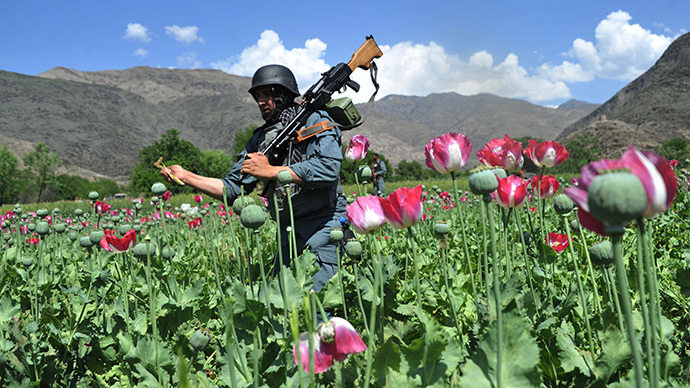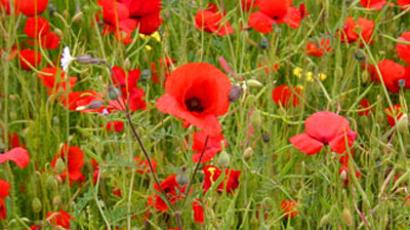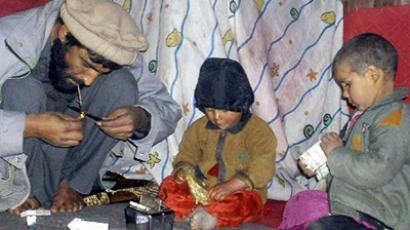Poppy fields forever? Record opium output boosts Afghan warlords’ power base

Despite efforts to curb Afghan’s opium culture, cultivation has hit record levels as NATO forces prepare to exit the country. The UN warned warlords may be the biggest benefactor of the situation.
The report, the Afghanistan Opium Survey for 2013, provides little cause for optimism among countries that have witnessed a surge in incidences of heroin abuse among their populace since US-led forces started a military offensive against the Taliban on Afghan soil in 2001.
Afghanistan, long the world’s main heroin supplier, has seen its total area of poppy seed plantations explode to 516,000 acres - a 36 percent increase from 2012, according to the report, released on Wednesday.
Last year, the war-torn Central Asian country accounted for 75 percent of the world’s opium supplies; Jean-Luc Lemahieu, head of the UN Office on Drugs and Crime (UNODC) in Afghanistan, has said in the past that supplies may reach 90 percent of the global total this year.
The new data surpasses the previous record set in 2007, when 477,000 acres were cultivated, according to the UN drug watchdog. Total opium output is estimated at 5,500 tons, up 49 percent from 3,700 tons in 2012.
At the same time, efforts to eradicate poppy fields have waned, with the total area targeted down 24 percent from last year.
With profits from opium cultivation nearing $1 billion, or 4 percent of gross domestic product, insurgency groups like the Taliban will only benefit from the cash crop.
A massive inflow of cash connected to the sale of opium has
helped the Taliban insurgency, which imposes a tax on poppy
farmers in areas it controls, in addition to the outright
participation in the selling and transferring of the crop.
Afghan government officials and tribal warlords have also helped
themselves to a piece of the opium trade action.
"The short-term prognosis is not positive," said Jean-Luc
Lemahieu, as quoted by Reuters. "The illicit economy is
establishing itself, and seems to be taking over in importance
from the licit economy."
One reason for the surge in opium cultivation is the lack of political will, which is noticeably lacking with April presidential elections on the horizon, Lemahieu said. Afghan President Hamid Karzai is ineligible to run again, while some of the potential candidates receive their financial support from poppy producers.
Afghan authorities, however, pointed to some successes in
stemming the opium business.
“Last year alone we confiscated 14 percent of the narcotics produced in Afghanistan and arrested 4,000 smugglers, including small, midrange and major smugglers,” Maj. Gen. Khalilullah Bakhtiyar, head of operations for the Afghan government’s Counter Narcotics Police, told The New York Times.
UNODC carried out its first survey of the Afghan poppy, the source of opium, in 1994. At that time, the crop covered some 175,000 acres. The territory increased to more than 247,000 acres after US-led forces removed the Taliban in 2001.
Last month, UNODC chief Yuri Fedotov, a Russian national, told Reuters the opium situation presented grave threats to the future of Afghanistan.
"We have a serious risk that without international support, without more meaningful assistance, this country may continue to evolve into a full-fledged narco-state," he said.
This is a serious problem not only for Afghanistan, but for Europe and Russia, which have both witnessed a dramatic spike in heroin abuse since 2001.
The US-led coalition has rejected any crop eradication operations
by its soldiers for fear of bankrupting farmers and forcing them
to join the insurgency, a policy criticized by Russia, among
others.














